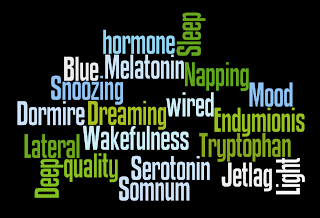Blog 2: On Sleep
I'm generally interested in what makes us human, but also in what makes exceptional humans - how they lived, what they did that led them to make extraordinary impact.
I am writing this blog entry in Frankfurt Airport, and I'm very tired so the subject matter is close to my heart. Like a lot of people today I probably don't get enough sleep, and I am certainly interested in how I can make the most of the sleep I do get. Over the past few years I have collected snippets of research on sleep and followed the thinking of specialists. I have experimented with various ideas and I feel ready to draw some conclusions. Of course, I am not a professor of sleep - none of what follows is proven in any rigorous way, but (in the fashion of the natural philosophers I admire so much) it has all been subjected to my own experiments. I hope you find it interesting, thought provoking and useful. In this first post on the subject I'll discuss the sleep cycle and napping. In the next post I'll look at wakefulness, caffeine, jet lag, insomnia and reprogramming your cycle.
Stage 1 - feeling drowsy
Stage 2 - falling into a light sleep
Stage 3/4 - deep sleep
Stage 5 - Dreaming and REM (rapid eye movement)
A healthy night’s sleep will have 4-6 complete cycles. This was something of a revelation to me - you don't have to be spark out for the whole time, and it is perfectly normal to be close to waking during the night. It would seem that part of the trick is to wake up at the right point in the cycle.
There is a cool app (introduced to me by my good friend Toby Godfrey) that lets you monitor these patterns. It's called Sleep Cycle. It works by using the iPhone's accelerometers. You run the app and put the phone under your pillow. The accelerometers measure the patterns of your movement while sleeping, and correlate them with the various stages of sleep.
Another useful function of the app is that you can specify a window of time over which you want your alarm to go off and the app choses the point in your cycle when you are in the lightest phase of sleep. If your alarm goes off during a deep phase of sleep you will feel groggy and tired - waking up at the optimal time makes for a whole different experience. For me it worked like a dream. You can also gather statistics. It's neat because I can treat the whole thing like an experiment - and the app gives me an instrument to make the measurements I need to test out different approaches. Here's an example of the data I can study about myself:
It seems that sleep needs both duration and quality. One thing that seems to affect that strongly is whether or not you nap during the day, and if so when.
I am writing this blog entry in Frankfurt Airport, and I'm very tired so the subject matter is close to my heart. Like a lot of people today I probably don't get enough sleep, and I am certainly interested in how I can make the most of the sleep I do get. Over the past few years I have collected snippets of research on sleep and followed the thinking of specialists. I have experimented with various ideas and I feel ready to draw some conclusions. Of course, I am not a professor of sleep - none of what follows is proven in any rigorous way, but (in the fashion of the natural philosophers I admire so much) it has all been subjected to my own experiments. I hope you find it interesting, thought provoking and useful. In this first post on the subject I'll discuss the sleep cycle and napping. In the next post I'll look at wakefulness, caffeine, jet lag, insomnia and reprogramming your cycle.
A defining characteristic of the life I have chosen: it's impossible to complete all the tasks I need to do each day. Years pass. I
have gradually worked longer, and slept less. It is normal to be awake and
working at 1AM and 2AM, and by 6AM it will be time to rise and start again. Add
some international travel, or a session of working all night: My sleep cycle
crashes, and is wrecked – the tyres deflate, and the spokes point in weird,
unfamiliar directions. I really care about sleep and want to improve it
(conversely I also really care about being awake and my mental state then – but
that’s for another day).
I am a light sleeper: I wake up several times a night. This used to distress me to an extent, and only made things worse. But then I found out about the sleep cycle. One model of how we sleep suggests we cycle through a pattern of:Stage 1 - feeling drowsy
Stage 2 - falling into a light sleep
Stage 3/4 - deep sleep
Stage 5 - Dreaming and REM (rapid eye movement)
A healthy night’s sleep will have 4-6 complete cycles. This was something of a revelation to me - you don't have to be spark out for the whole time, and it is perfectly normal to be close to waking during the night. It would seem that part of the trick is to wake up at the right point in the cycle.
There is a cool app (introduced to me by my good friend Toby Godfrey) that lets you monitor these patterns. It's called Sleep Cycle. It works by using the iPhone's accelerometers. You run the app and put the phone under your pillow. The accelerometers measure the patterns of your movement while sleeping, and correlate them with the various stages of sleep.
Another useful function of the app is that you can specify a window of time over which you want your alarm to go off and the app choses the point in your cycle when you are in the lightest phase of sleep. If your alarm goes off during a deep phase of sleep you will feel groggy and tired - waking up at the optimal time makes for a whole different experience. For me it worked like a dream. You can also gather statistics. It's neat because I can treat the whole thing like an experiment - and the app gives me an instrument to make the measurements I need to test out different approaches. Here's an example of the data I can study about myself:
It seems that sleep needs both duration and quality. One thing that seems to affect that strongly is whether or not you nap during the day, and if so when.
Napping. Some cultures almost insist on this. In the UK it is somewhat derided. The BBC ran a documentary a while back covering various aspects of sleep and on the programme they presented thinking around when to nap, and when not to nap:
I've experimented with this myself - falling asleep in the early evening is a disaster, and napping mid-morning seems unnatural. However, a mid-afternoon nap of around 20 minutes often leaves me feeling refreshed.
For the moment, a few thoughts. Leonardo Da Vinci would take regular breaks from painting to rest. There is a growing body of evidence that sleep is helpful in allowing the brain to order a set of recently assimilated ideas into a logical sequence. Sleeping at the right time, in the right conditions, waking at the right time and being disciplined about when to snooze (disciplined snoozing? Oxymoron?) are all components of skilful living. There is also, on a less positive note, a culture of machismo about getting by on a few hours of sleep that is unhealthy. Some research points to reductions in life expectancy associated with reduced sleep. However, I have to urge caution. Many of the studies I have read used very limited samples, and yet were forthright in their conclusions. For now, what I have learnt is that managing my sleep cycle in a smart way seems to have a big impact on how alert I feel, and my general sense of well being. Night, night.
For the moment, a few thoughts. Leonardo Da Vinci would take regular breaks from painting to rest. There is a growing body of evidence that sleep is helpful in allowing the brain to order a set of recently assimilated ideas into a logical sequence. Sleeping at the right time, in the right conditions, waking at the right time and being disciplined about when to snooze (disciplined snoozing? Oxymoron?) are all components of skilful living. There is also, on a less positive note, a culture of machismo about getting by on a few hours of sleep that is unhealthy. Some research points to reductions in life expectancy associated with reduced sleep. However, I have to urge caution. Many of the studies I have read used very limited samples, and yet were forthright in their conclusions. For now, what I have learnt is that managing my sleep cycle in a smart way seems to have a big impact on how alert I feel, and my general sense of well being. Night, night.






Comments
Post a Comment